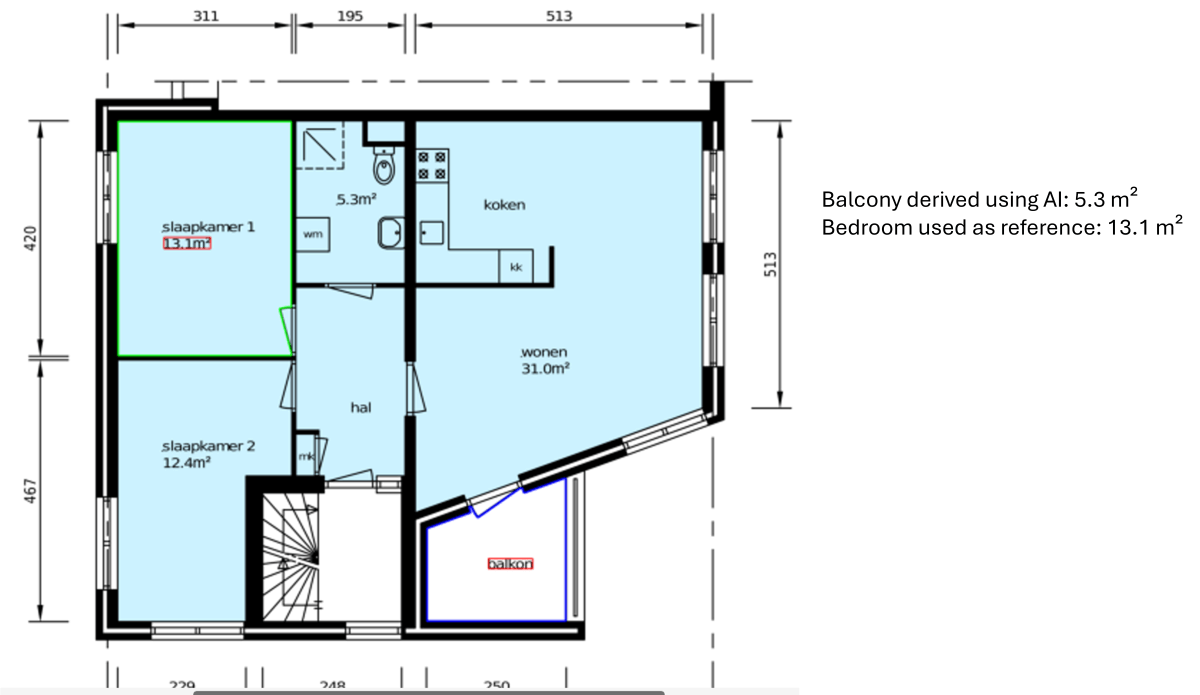Passionned Group deploys AI to tackle a critical housing challenge
Woonin, a Dutch housing organization dedicated to providing affordable homes for society’s most vulnerable, recently faced a significant challenge. In July, a new rent law was introduced, requiring rents to be calculated based on the precise square footage of outdoor spaces such as balconies and roof terraces. This was a major departure from the previous point-based system, which used rough categories for rent adjustments. The new system, where each square meter of outdoor space adds about two euros to the rent per month, demanded an extremely precise inventory of 35,000 properties. Given the complexity and urgency, Woonin turned to Passionned Group and their seasoned data scientist, Longhow Lam, for help. Their innovative use of AI and computer vision transformed this daunting task into a streamlined process, delivering results that exceeded expectations and encouraged Woonin to further embrace data-driven solutions.
The challenge: outdated plans, inconsistent data, and time pressure
 The shift to the new rent law presented multiple challenges. “We didn’t have exact data on which homes had balconies or how large they were,” said Mark Rossen, IT consultant at Woonin. “Manually inspecting 35,000 properties wasn’t feasible.” Adding to the complexity, Woonin’s floor plans were often outdated and inconsistent. Terminology like “balcony,” “roof terrace,” and “loggia” was used interchangeably, and many plans lacked measurements altogether.
The shift to the new rent law presented multiple challenges. “We didn’t have exact data on which homes had balconies or how large they were,” said Mark Rossen, IT consultant at Woonin. “Manually inspecting 35,000 properties wasn’t feasible.” Adding to the complexity, Woonin’s floor plans were often outdated and inconsistent. Terminology like “balcony,” “roof terrace,” and “loggia” was used interchangeably, and many plans lacked measurements altogether.
Time pressure added another layer of difficulty. “The law was announced just four days before implementation,” Mark continued. “We didn’t just see this as a technical problem—it was a moral responsibility. As a nonprofit, it’s critical to ensure our tenants aren’t overcharged unfairly.”
The solution: AI and computer vision to the rescue
Passionned Group stepped in with a cutting-edge approach to automate the process of measuring outdoor spaces. Together with Longhow Lam, they developed a four-step AI-driven workflow:
- Converting floor plans to images: Using Python, floor plans in PDF format were converted to image files (PNG), making them easier to analyze with Artificial Intelligence tools.
- Text recognition with OCR: Using Tesseract OCR, the system identified keywords such as “balcony” and “loggia” within the plans.
- Pixel analysis with computer vision: OpenCV, a computer vision library, was deployed to identify balcony contours and count pixels. These were then converted to square meters using reference spaces like bedrooms.
- Cloud computing for speed: A virtual machine in the Google Cloud with 60 cores and 240GB of RAM enabled rapid parallel processing, cutting analysis time from 30 hours to just one hour.
Mark was impressed by the team’s adaptability. “Initially, we used kitchens as a reference point, but their cluttered layouts created issues. Switching to bedrooms was a game-changer, and the team implemented this adjustment seamlessly.”
 Figure 1: An annotated floor plan showcasing the AI-calculated balcony area of 5.3 m², using a 13.1 m² bedroom as a reference point for precise measurements.
Figure 1: An annotated floor plan showcasing the AI-calculated balcony area of 5.3 m², using a 13.1 m² bedroom as a reference point for precise measurements.
The solution was refined over three iterations. A pilot run analyzed 500 homes, incorporating feedback to enhance accuracy. Once the process was perfected, the full dataset of 35,000 homes was analyzed.
The results: precision, efficiency, and inspiration
Partnering with Passionned Group brought transformative results for Woonin. “This solution saved us weeks of manual labor,” Mark reported. The AI-driven process produced reliable data to comply with the new rent law, with only a small percentage of plans requiring manual checks due to poor quality. By combining AI results with Woonin’s internal datasets, the team achieved high data quality and fair rent calculations.
We now have data quality that is reliable enough to correctly apply the new rent law.
Longhow Lam emphasized the project’s focus on practical problem-solving. “We used straightforward data science, avoiding unnecessary generative AI hype, to deliver impactful results.” The scalability of cloud computing also impressed Woonin. “The ability to scale capacity so quickly was eye-opening,” Mark said. “It’s inspired us to explore more ways to leverage data analytics.”
Looking ahead: embracing a data-driven future
Reflecting on the collaboration, Woonin sees this as a springboard for further innovation. “The speed and precision exceeded our expectations,” Mark noted. They are now inspired to learn more about data analysis and technology. “This experience has sparked ideas for applying these techniques to other challenges, like managing our database of millions of documents.” Longhow summarized, “With the right tools and a practical approach, even complex problems become solvable. Data science isn’t about the hype—it’s about delivering real solutions.”
Thanks to Passionned Group’s expertise, Woonin now has high-quality data to ensure fair rent calculations, underscoring the power of technology and human collaboration to drive positive change.



